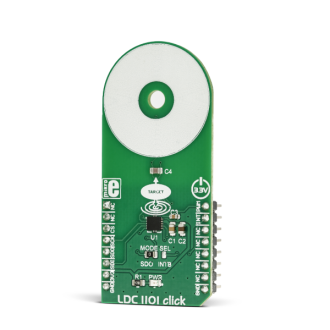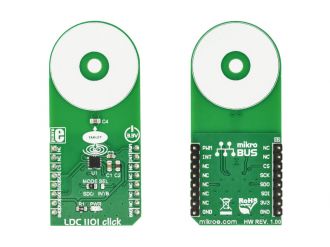
We strongly encourage users to use Package manager for sharing their code on Libstock website, because it boosts your efficiency and leaves the end user with no room for error. [more info]

Rating:
Author: MIKROE
Last Updated: 2018-11-19
Package Version: 1.0.0.0
mikroSDK Library: 1.0.0.0
Category: Inductance
Downloaded: 5355 times
Not followed.
License: MIT license
LDC1101 click is an inductance-to-digital converter Click Board. It is designed for a range of different applications, based on the inductivity measurements. You can use it to detect the position, rotation, or motion of an object. LDC1101 carries the LDC1101, the integrated, high-resolution, high-speed, inductance-to-digital converter.
Do you want to subscribe in order to receive notifications regarding "LDC 1101 click" changes.
Do you want to unsubscribe in order to stop receiving notifications regarding "LDC 1101 click" changes.
Do you want to report abuse regarding "LDC 1101 click".


Library Description
The library initializes and defines the SPI bus driver and drivers that offer a choice for writing data in address and reading data from address. The library includes function for read RP data and L data. The user also has the function for initializes chip, funstion for go to RP mode or L mode, Function for set porew mode and function for read interrupt state.
Key functions:
uint8_t ldc1101_init() - Functions for initialization chipvoid ldc1101_setPowerMode(uint8_t mode) - Functions for settings power modevoid ldc1101_goTo_RPmode() - Functions for go to RP modeuint16_t ldc1101_getRPData() - Functions for reads RP dataExamples description
The application is composed of the three sections :
void applicationTask()
{
RP_Data = ldc1101_getRPData();
IntToStr(RP_Data, demoText);
mikrobus_logWrite(" Inductive Linear Position :", _LOG_TEXT);
mikrobus_logWrite(demoText, _LOG_LINE);
Delay_100ms();
}
Other mikroE Libraries used in the example:
SPIUARTAdditional notes and information
Depending on the development board you are using, you may need USB UART click, USB UART 2 click or RS232 click to connect to your PC, for development systems with no UART to USB interface available on the board. The terminal available in all MikroElektronika compilers, or any other terminal application of your choice, can be used to read the message.